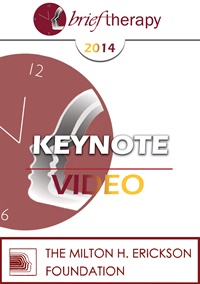
- Average Rating:
- Not yet rated
- Topic Areas:
- Attachment | Keynotes | Psychotherapy | Brief Therapy | Couples Therapy
- Categories:
- Brief Therapy Conference | Brief Therapy Conference 2014
- Faculty:
- Sue Johnson, EdD
- Course Levels:
- Master Degree or Higher in Health-Related Field
- Duration:
- 1:03:37
- Format:
- Audio and Video
- Original Program Date:
- Dec 11, 2014
- Short Description:
- There are currently over 400 specific approaches to psychotherapy and many therapeutic tribes. Attachment theory and science with its intrapsychic and relational focus offers the therapist a broad, integrative but systematic guide to the nature of dysfunction and health and how to move individuals, couples and families from one to the other. This presentation will offer a guide as to how this science can help to make our sessions relevant and on target in terms of leading to better affect regulation, cognitive coherence and supportive, stable relationships.
- Price:
-
Sale is $29.00
price reduced from Base Price - $59.00
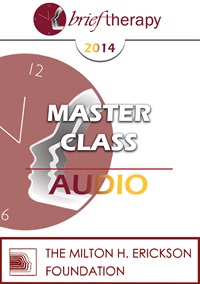
- Average Rating:
- Not yet rated
- Topic Areas:
- Ericksonian Psychotherapy | Master Classes | Brief Therapy | Ericksonian Hypnosis and Therapy Techniques | Experiential Therapy | Psychotherapy | Solution Oriented Approach
- Categories:
- Brief Therapy Conference | Brief Therapy Conference 2014 | Master Class
- Faculty:
- Jeffrey Zeig, PhD | Bill O'Hanlon, MS
- Duration:
- 5:51:06
- Format:
- Audio Only
- Original Program Date:
- Dec 15, 2014
- Short Description:
- Many schools of psychotherapy have been derived from the seminal work of Milton H Erickson M.D., including strategic therapy, interactional therapy, NLP and solution focused therapy. In some approaches hypnosis is central; in other approaches hypnosis is more peripheral. This class features two experts personally trained by Dr. Erickson, each of whom approach psychotherapy from somewhat different perspectives. In his approach, Possibility Therapy, Bill O'Hanlon epitomizes the strengths of a solution focused orientation. In his experiential approach, Jeffrey Zeig shades treatment in the direction of developing dramatic reference experiences.
- Price:
- $15.00 - Base Price
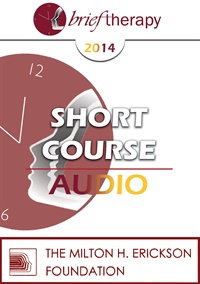
- Average Rating:
- Not yet rated
- Topic Areas:
- Ericksonian Psychotherapy | Psychotherapy | Trauma | Short Courses | Children and Adolescent Therapy | Pain and Healing | Brief Therapy | Ericksonian Hypnosis and Therapy Techniques
- Categories:
- Brief Therapy Conference | Brief Therapy Conference 2014
- Faculty:
- Maria Escalante de Smith, MA
- Duration:
- 1:09:29
- Format:
- Audio Only
- Original Program Date:
- Dec 11, 2014
- Short Description:
- When children experience painful emotions and anxiety after going through traumatic events they may not be able to understand what is happening to them and thus get depressed. Other consequences may appear, like lack of concentration or academic problems. Attendants will learn how treat these conditions by using brief Ericksonian techniques, assignments, and toys and by including the family members during therapy.
- Price:
- $15.00 - Base Price
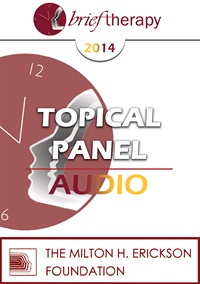
- Average Rating:
- Not yet rated
- Topic Areas:
- Psychotherapy | Topical Panels | Research
- Categories:
- Brief Therapy Conference | Brief Therapy Conference 2014
- Faculty:
- Scott Miller, PhD | Michael Yapko, PhD | Ernest Rossi, PhD
- Duration:
- 1:01:28
- Format:
- Audio Only
- Original Program Date:
- Dec 13, 2014
- Short Description:
- BT14 Topical Panel 01 - Research in Psychotherapy - Ernest Rossi, PhD, Scott Miller, PhD, and Michael Yapko, PhD Educational Objectives: Compare and contrast clinical philosophical perspectives of experts.
- Price:
- $15.00 - Base Price
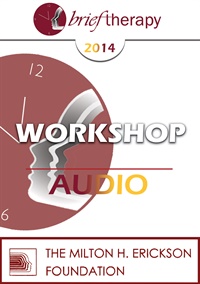
- Average Rating:
- Not yet rated
- Topic Areas:
- Psychotherapy | Workshops | Generative Psychotherapy | Leadership | Therapist Development | Brief Therapy
- Categories:
- Brief Therapy Conference | Brief Therapy Conference 2014
- Faculty:
- Stephen Gilligan, PhD
- Duration:
- 2:02:36
- Format:
- Audio Only
- Original Program Date:
- Dec 12, 2014
- Short Description:
- His workshop will explore how generative psychotherapy can help clients activate the creative consciousness needed to live their lives in positive, fulfilling ways. This process requires the cultivation of self-leadership (and self-COACH) skills, such that a person’s performance self and observer self-work in a mutually respectful, harmonious pattern. The workshop presents some core methods of this approach, including somatic modeling, self-scaling, and engaging the creative unconscious. A demonstration and multiple case examples will illustrate how such methods can allow psychotherapy to be a deeply positive, effective conversation.
- Price:
- $15.00 - Base Price
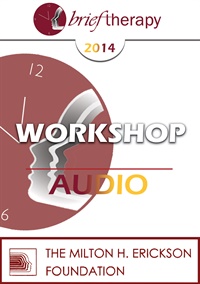
- Average Rating:
- Not yet rated
- Topic Areas:
- Post-Traumatic Stress Disorder (PTSD) | Workshops | Brief Therapy | Psychotherapy | Trauma
- Categories:
- Brief Therapy Conference | Brief Therapy Conference 2014
- Faculty:
- Donald Meichenbaum, PhD
- Duration:
- 1:02:28
- Format:
- Audio Only
- Original Program Date:
- Dec 12, 2014
- Short Description:
- This workshop will demonstrate ways to implement the core tasks of psychotherapy with individuals with Complex PTSD and ways to provide integrated treatment for comorbid disorders such as Prolong and complicated grief, suicidality and substance abuse disorders. A Case Conceptualization Model will be offered that informs treatment decision making. Specific evidence-based interventions will be examined.
- Price:
- $15.00 - Base Price
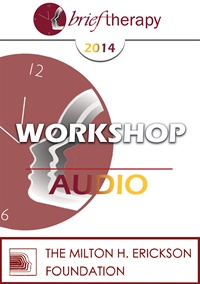
- Average Rating:
- Not yet rated
- Topic Areas:
- Workshops | Feedback Informed Treatment (FIT) | Tailoring | Therapist Development | Psychotherapy | Brief Therapy
- Categories:
- Brief Therapy Conference | Brief Therapy Conference 2014
- Faculty:
- Scott Miller, PhD
- Duration:
- 1:42:31
- Format:
- Audio Only
- Original Program Date:
- Dec 12, 2014
- Short Description:
- It’s not a pretty picture. Available evidence indicates that the effectiveness of psychotherapy has not improved in spite of 100 years of theorizing and research. What would help? Not learning a new model of therapy or the “latest” so-called “evidence-based” treatment approach. And no, not attending another CEU event or sorting through that stack of research journals by your desk. A simple, valid, and reliable alternative exists for maximizing the effectiveness and efficiency of treatment based on using ongoing client feedback to empirically tailor services to the individual client needs and characteris- tics.
- Price:
- $15.00 - Base Price
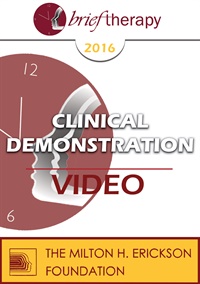
- Average Rating:
- Not yet rated
- Topic Areas:
- Clinical Demonstrations | Brief Therapy | Hypnosis | Psychotherapy
- Categories:
- Brief Therapy Conference | Brief Therapy Conference 2016
- Faculty:
- Ernest Rossi, PhD | Richard Hill, MBMSc, MEd, MA
- Course Levels:
- Master Degree or Higher in Health-Related Field
- Duration:
- 1:00:41
- Format:
- Audio and Video
- Original Program Date:
- Dec 10, 2016
- Short Description:
- We illustrate how easy it is to learn and apply the quantum dynamics of Rossi’s Hand Polarity Techniques to facilitate brief psychotherapy and hypnosis. First we will engage the entire audience in a live demonstration of how to experience, recognize and enhance the quantum dynamics our natural 4-stage creative cycle of problem solving and healing in everyday life.
- Price:
-
Sale is $29.00
price reduced from Base Price - $59.00
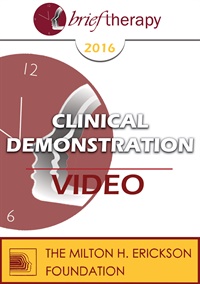
- Average Rating:
- Not yet rated
- Topic Areas:
- Psychotherapy | Clinical Demonstrations | Generative Psychotherapy | Unconscious Processes
- Categories:
- Brief Therapy Conference | Brief Therapy Conference 2016
- Faculty:
- Stephen Gilligan, PhD
- Course Levels:
- Master Degree or Higher in Health-Related Field
- Duration:
- 58:40
- Format:
- Audio and Video
- Original Program Date:
- Dec 10, 2016
- Short Description:
- Problems/Symptoms may be viewed as attempts by the creative unconscious to bring transformation and healing. A generative state can allow that transformation to be realized.
- Price:
-
Sale is $29.00
price reduced from Base Price - $59.00

- Average Rating:
- Not yet rated
- Topic Areas:
- Psychotherapy | Clinical Demonstrations | Mindfulness
- Categories:
- Brief Therapy Conference | Brief Therapy Conference 2016
- Faculty:
- Ronald Siegel, PsyD
- Course Levels:
- Master Degree or Higher in Health-Related Field
- Duration:
- 1:00:05
- Format:
- Audio and Video
- Original Program Date:
- Dec 10, 2016
- Short Description:
- Clinicians are enthusiastically discovering that mindfulness practices can enlighten and enliven their lives, both inside and outside the therapy hour. These techniques hold great promise for personal development and as a powerful method to enhance virtually all forms of psychotherapy. But what does mindfulness-informed therapy actually look like? This demonstration, using volunteers from the audience, will illustrate how mindfulness practices and insights derived from them can inform treatment.
- Price:
-
Sale is $29.00
price reduced from Base Price - $59.00
Tags: Mindfulness Psychotherapy
Please wait ...

